By JULIE MINDA
May 14, 2020
With some of its facilities among the first in the nation to treat patients with COVID-19, and with many of its hospitals and nursing homes located in hotspots, Providence St. Joseph Health had to be smart and nimble in how it structured its response to the coronavirus, and that included its handling of emerging and ongoing ethical dilemmas.
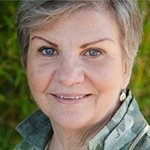
Pavic-Zabinski
During a May 6 webinar hosted by CHA, seven of Providence's senior ethics leaders described how the 51-hospital system has organized to respond to the numerous ethical issues elevated by the pandemic. "Some of the lessons we've learned have had to do with the need to collaborate … and the need for transparency, communication and education," said panelist Karen Pavic-Zabinski, regional director of ethics for Providence's Southern California region. She said despite the pandemic being a time of great change, "Our commitment to our mission, vision and ethics has not changed."
The webinar, "Ethics Support in Responding to COVID-19: A Case Study of Providence St. Joseph Health," is available for replay.
Structured approach
Peter Cataldo is senior vice president for theology and ethics for Providence St. Joseph, which has facilities across the continuum of care in Alaska, California, Montana, New Mexico, Oregon, Texas and Washington. He said the system's standing Ethics Leadership Council, made up of all the regional ethicist leaders, guided its ethics response from the start of the pandemic. This included regular calls to field emerging, time-sensitive ethics issues and to share updates. Among the top ethical issues this council has been addressing are how to handle do not resuscitate order complications for COVID-19 patients, particularly those who are not capable of informed consent.
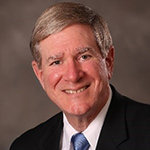
Cataldo
For instance, under crisis standards of care, could a physician sign a do not resuscitate order if he or she could not secure patient or family consent, because of limitations imposed by the patient's condition? Cataldo said Providence physicians have not encountered this situation, but ethicists had planned for it. Ethicists also considered, from an ethical perspective, whether patients included in clinical trials of COVID-19 therapies should be given special consideration.
Cataldo said the ethics council developed — in collaboration with an interdisciplinary team of colleagues — ethical guidelines tailored to COVID-19 that built on preexisting ethics protocols. The guidelines address such topics as the allocation of scarce resources including personal protective gear and protocols for triage teams.
Providence regions have been using the framework, along with state and local guidelines, to customize their ethics approach to the needs of their local hospitals' and their patients and communities. Cataldo said CHA members can request the framework from him, if they wish to use it for their own learning. To make this request, CHA members can click on reporter Julie Minda's byline at the top of this story and fill out the web email form. She will connect them with Cataldo.
First cases
Dr. Andrea J. Chatburn is regional director of ethics for Providence St. Joseph in Eastern Washington and Montana. She noted that, in January, Providence Regional Medical Center in Everett, Washington, treated the first patient in the U.S. diagnosed with the virus. Providence Sacred Heart Medical Center in Spokane, Washington, a designated treatment center for patients exposed to pathogens, accepted four COVID-19 patients in February from a cruise ship. Chatburn said that it was clear at the outset that the health system would have to coordinate very closely with competing facilities.
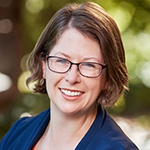
Chatburn
She emphasized the need for every participant in these regional collaborations to be on the same page when it came to what phase of response the region was in: conventional, contingency or crisis. She said her region has been operating often at a contingency level but has not had to escalate to a crisis level. At the contingency level, only emergency care — not elective care — is delivered, and care delivery decisions are made based on the availability of "people, places and products."
Decision-making matrix
Webinar panelist Nicholas Kockler, regional director of the Providence Center for Health Care Ethics in Portland, Oregon, said that in addition to the system-level framework described by Cataldo, real-time ethics decision-making has been heavily influenced by a matrix developed by the now-retired Rev. John Tuohey, who was Kockler's predecessor.
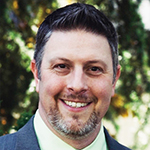
Kockler
The "Matrix for Ethical Decision-Making in Public Health Crises" helps ethicists and others to weigh the tensions between social solidarity, professionalism and justice. For instance, it helps ethicists tease out the ethical principles at stake when a professional's "duty to care" goes up against the social solidarity need to address the "common good."
Connections
Pavic-Zabinski said she made education, communication and coordination the pillars of her work in the expansive Providence Southern California region. This included outreach to internal leadership and colleagues, community members, parishes and other community organizations and competing health care facilities. She's also stayed in close communication with physicians — in California, hospitals cannot directly employ physicians and it is common for physicians to practice at multiple, competing facilities.
Pavic-Zabinski was involved in the development and preparation of triage teams, which are multidisciplinary groups that take on pressing ethical concerns, mostly those that arise at the bedside. She participated with triage team members in deliberations to resolve mock cases. The practice was intended to build experience and confidence, and to ward off anxiety and moral distress related to crisis decision making.
Supporting nursing homes
The hardest hit population in this pandemic is the frail elderly — and they have been a major area of focus in Providence St. Joseph's Texas and New Mexico region, which includes the system's Covenant Health System of Lubbock, Texas. Doyle Patterson, a clinical ethicist in that region, said Covenant's emergency department at its flagship hospital in Lubbock was becoming overloaded, in large part because area nursing homes were transferring significant numbers of their residents with COVID-19 for emergency care. This included seniors who had do-not-resuscitate orders and others who Covenant leadership believed could have been successfully treated at the nursing homes.
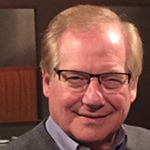
Patterson
Patterson said Covenant determined the nursing homes were under-resourced and overburdened and felt-ill prepared to handle COVID-19. And so, Covenant has been assisting the nursing homes with creating structures to better ensure care is delivered in the most appropriate place and that residents have advance care plans in place.
Cultural barriers
Mark Carr, regional director of ethics for Providence St. Joseph's Alaska Region, said that the cultural factors in a community must figure into ethical discernment. For example, he said that many Alaska Native villages within the system's service area in Alaska have been devastated by past pandemics and that is top of mind for the tribes. Also, many of these native populations have high esteem for their elders and will want to have a voice in hospital policies and protocols for allocating scarce resources to people with the best chance of survival, patients who usually will be younger than people deemed too frail to benefit from resources like ventilators.
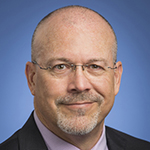
Carr
Carr told Catholic Health World that Providence Alaska leadership took part in conference calls with local health care providers to think through ethical issues that could arise, including "tie-breaker" decisions to allocate scarce resources. About a dozen of the 40 or so participants in these calls had direct experience providing health care to indigenous people and knew their traditions and priorities. The call participants kept these tribes' perspectives top of mind, he said.
Kockler and fellow webinar panelists said ethicists will need to be at the forefront as health care grapples with the evolutionary changes that have happened during the pandemic. To cite a few examples, these changes relate to social and financial upheaval, to the use of big data, to patient privacy in an emergency and the use of telehealth and distance learning.
"We'll have to be proactive," Kockler said of ethicists. "There are a lot of questions we'll need to sort through."
View the webinar recording